by Marivic A. Wance
Last November 4, 2024, the Municipal Local Government Unit (MLGU) of Kibungan Benguet sponsored the tree-caring activity through the Municipal Social Welfare and Development Office (MSWDO) that organized and funded it and the Municipal Environment and Natural Resources Office (MENRO ) that executed the activities all in collaboration with the Kibungan National High School bringing together 44 enthusiastic young participants. They were aided by their mentors, speakers, and facilitators having a total of 56 journeyers. The theme was “ Empowering Young Leaders for Environmental Care ” and it took place in Bowalan, Poblacion Kibungan, Benguet despite the challenges posed by Typhoon Leon. This initiative of the Municipal Council for the Protection of Children (MCPC) Child Representatives was made possible through the collaboration of these different offices with respect to the core rights of children regarding participation.
The training began with engaging lectures and discussions focused on pressing environmental issues, pertinent laws, and essential leadership principles. Esteemed employees of the Municipal LGU in the person of Mr. Roland D. Wance and Mr. David C. Paciteng led these sessions. They shared invaluable insights that inspired participants to take proactive steps toward environmental care. The highlight of the day was a hands-on tree-caring activity, coupled with a facility visit that allowed attendees to apply their newly acquired knowledge in real-world settings. This practical engagement not only deepened their understanding of environmental sustainability but also emphasized the importance of active participation in conservation efforts.
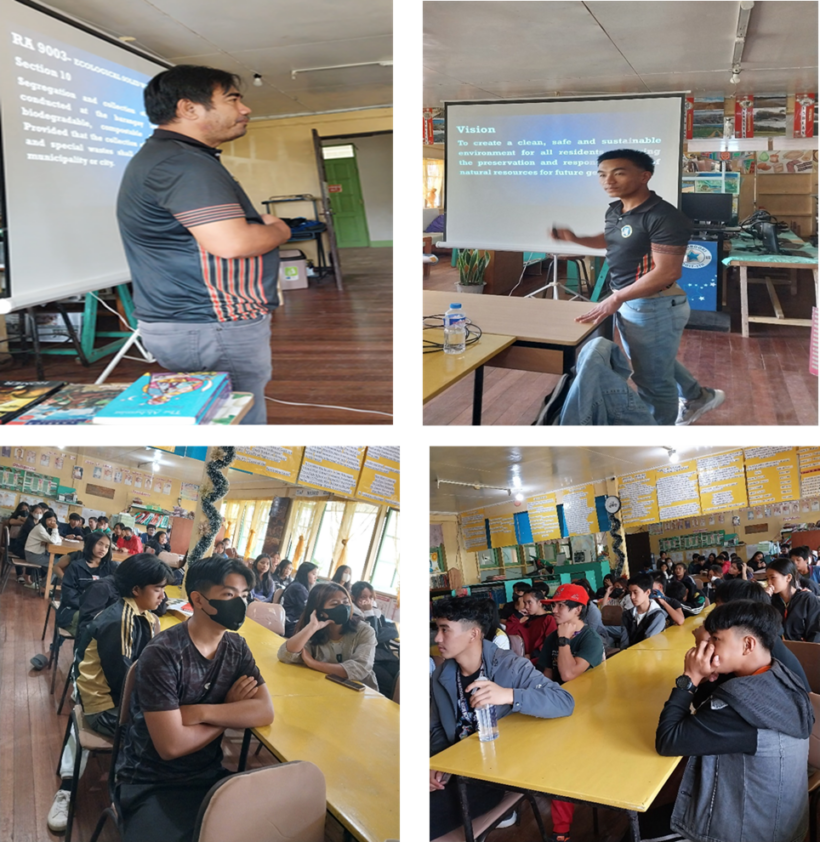
Young Leaders convened first at the School Library for the lectures. In the upper photos are Mr. Roland D. Wance (Right) and Mr. David C. Paciteng (Left) from the Municipal Environment and Natural Resources Section of the Mayor’s Office delivering their topics.
Caring for trees plays a crucial role in promoting sustainability and fostering a healthy environment within communities. The benefits of tree care extend beyond mere aesthetics, impacting ecological health, public well-being, and community cohesion. Further, the rapidly increasing households affected the management of waste that emerged as a critical environmental issue that requires collective responsibility. The notion that waste management is solely the duty of environmental workers is a misconception that undermines the role every individual plays in maintaining a sustainable environment.
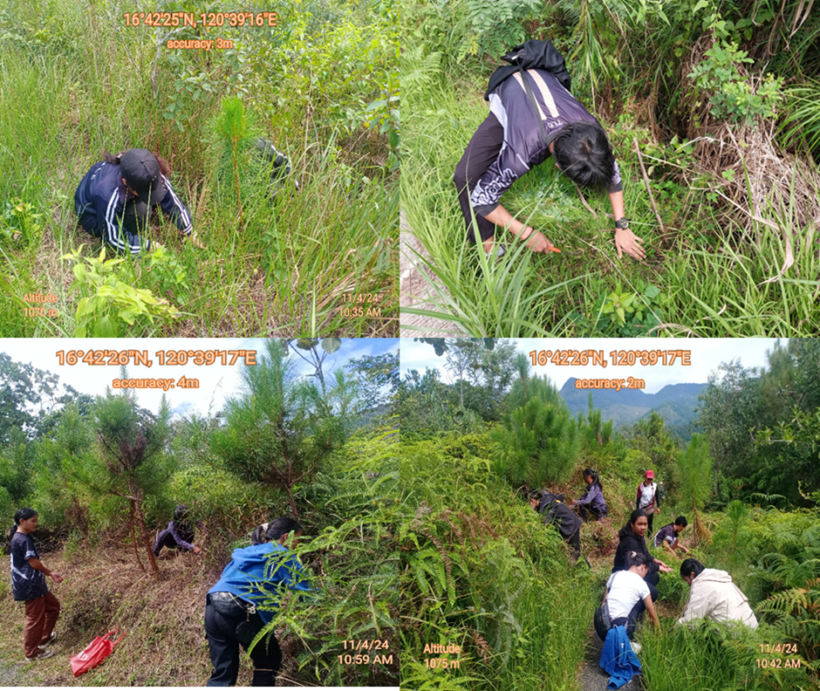
Tree Planting is not enough! Tree growing, like removing weeds, is imperative. Hurray to these young leaders who are taking action in Tree Growing (Pine Saplings planted in 2021 and 2023).
The success of this training is attributed to its holistic approach, which seamlessly blends theoretical knowledge with practical application. Participants were equipped with essential skills in leadership and advocacy, enabling them to mobilize their peers effectively and engage with community members on climate issues. Furthermore, the initiative sought to foster community engagement by encouraging the youth to lead projects and campaigns promoting sustainability. In addition to practical skills, the training emphasized advocacy for climate-friendly space and environment.
The impact of this initiative extends beyond individual empowerment; it aims to inspire broader community involvement in climate action initiatives. By promoting sustainable practices through educational campaigns and hands-on activities, the program anticipates a measurable increase in community members adopting sustainable behaviors as a direct result of youth-led initiatives as a way of empowering them. As the young leaders embark on their journey toward creating positive environmental impacts, the “Empowering Young Leaders for Environmental Care” training stands as a testament to the potential of youth-driven change. This initiative supports the United Nations’ Sustainable Development Goal (SDG) Number 13 on Climate Action, a goal that focuses on taking urgent action to combat climate change and its impacts. More specific is the SDG Target Goal 12.5 on reducing waste generation through prevention, reduction, recycling, and reuse.
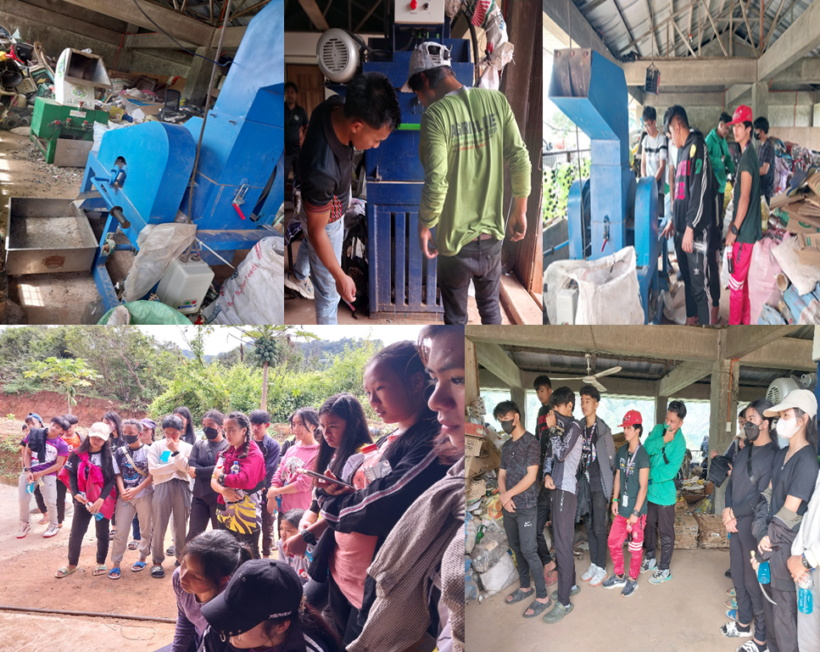
Operation and demonstration of the machines such as the bottle crusher, multi-purpose shedder, and baler by the MLGU workers.
The organizers expressed gratitude to all participants, speakers, and volunteers who contributed to making this event successful. They underscored the importance of continued support and collaboration in nurturing a generation of environmentally conscious leaders. By fostering leadership skills and encouraging active participation in environmental stewardship, Kibungan is cultivating a brighter future— one where youth play an integral role in shaping sustainable development goals and addressing climate change challenges head-on.
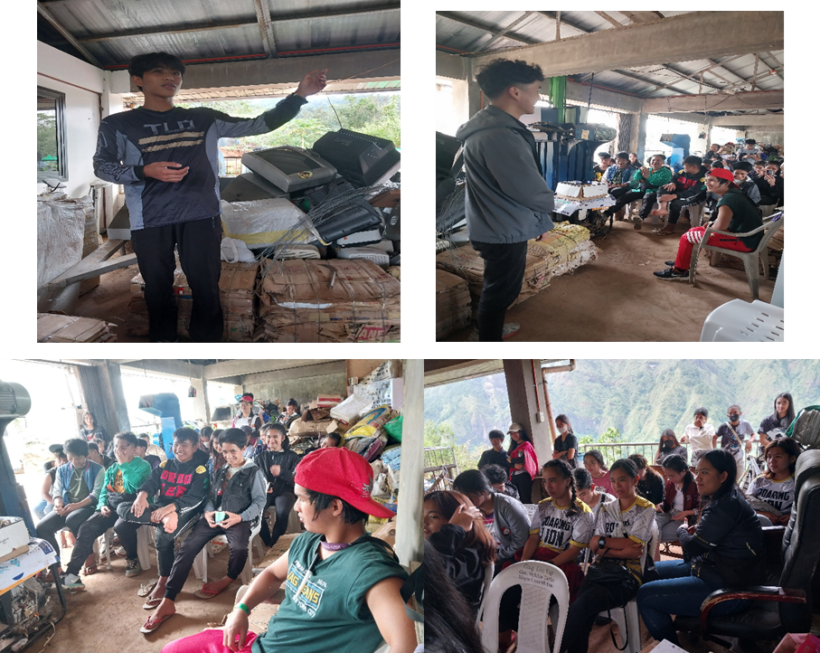
Upper photos: Young leaders expressing their gratitude for being trained as carers of the environment. Lower photos: The importance of learning key takeaways from their fellow participants.
Empowering children to take part in tree-caring initiatives enhances their self-confidence. This aligns with educational principles that emphasize the importance of active participation in learning environments. There were realizations shared like the misconception that waste management is solely the responsibility of municipal workers or environmental agencies. The apathy among community members was transformed because of the training that was given to them. The truth is every Filipino citizen must be responsible and play a crucial role in managing waste effectively. From proper waste segregation at home to participating in community clean-up drives, each action contributes to a healthier environment.
Education is vital in fostering a culture of concern in managing waste. Community awareness campaigns can inform residents about the environmental impacts of improper waste disposal and the benefits of sustainable practices. Schools, local organizations, and government bodies can collaborate to promote educational initiatives that encourage responsible behavior regarding waste.

After the activity, each young leader was handed a token of gratitude in the vernacular “namonamowaw” (“thank you”).
The management of waste is not just an environmental issue. It promotes shared responsibility that requires the citizen’s participation because they live in a community. By understanding each one’s roles and taking collective action, this can significantly reduce the environmental footprint and contribute to a sustainable future. It is essential for individuals to recognize that their daily choices matter and that together, we can create a cleaner, healthier environment for the present and future generations.
Reference:
United Nations. (2015). Transforming our world: The 2030 Agenda For Sustainable Development. United Nations.
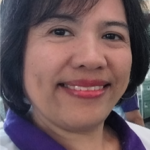 Marivic Wance is a dedicated social worker with over 24 years in local government service. She embodies the essence of true public service, continually seeking to understand and fulfill her role in helping others. Despite her long career, she remains committed to learning and growth, recognizing the ongoing potential for impact in her field. Driven by a passion to make a difference, Marivic consistently explores new ways to serve her community with genuine, heartfelt dedication. She is pursuing a Doctor of Philosophy in Administration and Supervision at Baguio Central University.
Marivic Wance is a dedicated social worker with over 24 years in local government service. She embodies the essence of true public service, continually seeking to understand and fulfill her role in helping others. Despite her long career, she remains committed to learning and growth, recognizing the ongoing potential for impact in her field. Driven by a passion to make a difference, Marivic consistently explores new ways to serve her community with genuine, heartfelt dedication. She is pursuing a Doctor of Philosophy in Administration and Supervision at Baguio Central University.
 Genevieve Balance Kupang is an applied cosmic anthropologist and a certified cultural mapper, currently serving as BCU’s Dean of the Graduate School and International Relations Officer. She is a member of Grupo Kalinangan, focusing on cultural heritage conservation through innovative IT tools and services, building capacities, and leveraging support systems. As a board member of the World University Network of Innovation (WUNI)-Leaders, she fosters global collaboration. She explores the intersections of culture, arts, peace, justice, integrity of creation, interfaith dialogue, curriculum and instruction. One of her greatest joys is empowering learners to realize their potential and encouraging them to share their unique voices with the world.
Genevieve Balance Kupang is an applied cosmic anthropologist and a certified cultural mapper, currently serving as BCU’s Dean of the Graduate School and International Relations Officer. She is a member of Grupo Kalinangan, focusing on cultural heritage conservation through innovative IT tools and services, building capacities, and leveraging support systems. As a board member of the World University Network of Innovation (WUNI)-Leaders, she fosters global collaboration. She explores the intersections of culture, arts, peace, justice, integrity of creation, interfaith dialogue, curriculum and instruction. One of her greatest joys is empowering learners to realize their potential and encouraging them to share their unique voices with the world.
